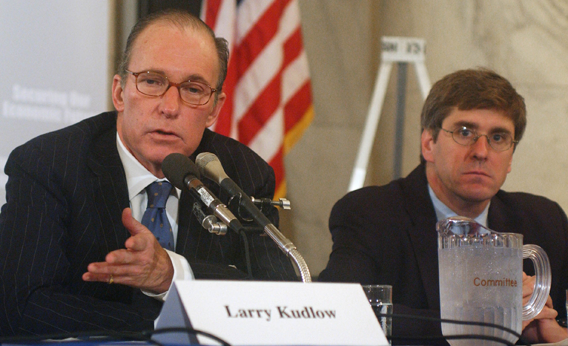The Libor scandal is perhaps the biggest market-rigging conspiracy in the history of global financial markets. Almost all interest rates are affected by Libor, so every person with outstanding bank-issued debt could be a victim of this cartel.
That’s why we have to beware when one of CNBC’s in-house apologists for Wall Street implies this criminal behavior didn’t hurt borrowers. Calling something a victimless crime is shorthand for saying: “Who cares?” Indeed, last week, CNBC’s Larry Kudlow went so far as to say that Barclays—which has admitted manipulating the rate—was the victim! Here is what Kudlow said:
“I mean, maybe you’re right, the victim was the lender, Barclays. But I don’t know. The Justice Department says this could be a criminal prosecution. I don’t get that. Who are the victims? Who are the victims?”
This is Alice in Wonderland logic: saying the criminal is the victim.
Let’s be clear: Every person whose interest rate depended on Libor is a victim. The rate you paid was not the product of honest competition and reporting. Some people lost lots of money because of the manipulation—other may have saved some—but the game was rigged. The integrity of the market was destroyed so the banks could put money in their own pockets—our money.
Kudlow’s statements are simply ridiculous, but there is something deeper going on here. When you claim “no harm, no foul”—even though there was plenty of harm and plenty of foul—then you also are denying the need to reform the structure that caused the problem.
Every Wall Street fraud—and we are in at least the third massive wave of such frauds since 2002 alone—is met with similar denials and rationalizations, such as:
- Analysts can lie because nobody should trust them anyway;
- Sub-prime mortgages can be sold and securitized fraudulently because the people borrowing are at fault;
- The insurance market can be rigged by AIG and Marsh because—well—we happen to like them;
- Libor can be rigged and manipulated because “who cares?”
But in the real world, rigging these markets and violating every one of the fiduciary relationships underlying Wall Street’s integrity has led to a general degradation of our financial system and the destruction of trust. The cost of that has been unfathomable.
Why can’t the defenders of the status quo just wake up and admit it?
